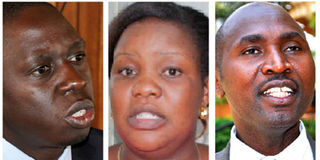Why NRM rules are bad for Parliament

Independent-minded MPs Nsereko (L), Nebanda and Ssekikubo (R).
What you need to know:
Gagging people’s representatives. The ruling party has shown its hand in the public. Party leaders in Parliament have drafted new rules of procedure which will among others shut up independent-minded lawmakers.
Gagging people’s representatives. The ruling party has shown its hand in the public. Party leaders in Parliament have drafted new rules of procedure which will among others shut up independent-minded lawmakers.
Like the proverbial frog in boiling water, independent-minded lawmakers have become accustomed to repeated attacks from their leaders in Parliament. The new draft rules make it compulsory for members to vote in a particular manner and binds them to support the agreed party positions in Parliament.
Any member who issues statements or leaks party information to the media and the general public without consent from the Caucus leadership commits an offence and could face expulsion and removal from party positions in Parliament. But the best weapon of a dictatorship is secrecy; the best weapon of a democracy is openness.
The drafting of the new law to silence members at a time when several ministers are facing serious corruption scandals certainly marks the culmination of what has now become an endless quarrel between the Executive and Parliament. Obviously, the timing of these rules is suspect.
Under these rules, it will be very difficult for Parliament to play its oversight functions particularly in the fight against corruption. The NRM Caucus will be the alpha and omega. However, the concern here is that lawmakers will be compelled to praise crooked ministers and party officials— all in the name of collective responsibility.
Numbers Vs reason
Fundamentally, the institution of Parliament has not been a place where ideas or legislation have been open for robust debate. The numbers verses reason tainted the 8th Parliament in many ways. Decisions were made by the Executive in private and Parliament called to rubber stamp them. Until recently, Parliament under Edward Ssekandi, served as a hollow theatre where individual interests prevailed over public happiness.
By silencing lawmakers, the proposed rules have let the cat out of the bag. Although some MPs seem not to understand what is going on, the truth is that the shadow is almost eating up its prey. The proposed rules in many ways mimic authoritarianism in what should have been a democracy. Preferably, the current multi-party system notwithstanding, legislators are supposed to be peoples’ representatives and should articulate electorates’ views in Parliament without any hassle.
According to common wisdom, the essence of democracy is embedded in legislators representing the preferences of their constituents and not parties when making key decisions in the House. In our context, if NRM doesn’t amend the draft rules, we might reasonably expect this to be more difficult for some members but it’s the right thing to do. While the draft rules are expected to ensure party discipline among others, it’s unreasonable for NRM leaders to propose that those who support divergent views whether in public interest or not should be reprimanded. This will be a disaster and will ultimately make Parliament a “toothless dog.”
Members are silently discussing new draft Rules of Procedure targeting mainly the “rebels within.” However, the targeted members are not taking these maneuvers calmly. Members like Theodore Ssekikubo (Lwemiyaga), Muhammad Nsereko (Kampala Central), Wilfred Niwagaba (Ndorwa East), Vincent Kyamadidi (Rwampara) and Ms Cerinah Nebanda (Butalejja) have vowed to defy the new party rules and accused their leaders of duplicity.
The draftsmen claim the intention is not to arm-twist MPs but to fortify internal cohesion within and amongst the NRM Caucus members to give full effect to the appreciation of group merit in a multiparty Parliament.
If this draft gets the Caucus approval, then, the NRM MPs will be digging their own political grave yards and as for the architects, they will have meticulously dismantled democratic processes envisaged in the 1995 Constitution under the doctrine of separation of powers, entrenched corruption in the system, stifled debate on matters of national importance and avoided making themselves accountable to Parliament or the citizenry.
Under the separation of powers model, the state is divided into branches (Executive, Parliament and Judiciary) each with separate and independent powers and areas of responsibility so that no one branch has more power than the other branches.
nfortunately, by silencing dissent, these rules definitely have one major masked objective —helping the Executive assert its influence over Parliament. Whether you like it or not, when NRM party “sneezes”, the entire Parliament catches a cold. Likewise, the current anti-graft fight is slowly taking shape because of the support of the NRM MPs. This is the fact. The NRM remains the only single party with absolute majority in the House. For that matter, silencing the majority is to kill the 9th parliament.
On the practical side, if it wasn’t the vigilance of the media and the so-called “rebel” MPs, with the diminutive opposition in the House, the Ninth Parliament would be “dead” just like the toothless Eighth Parliament.
In fact, as Ssekikubo and Nsereko put it during a press conference last week, the new rules seek to stop MPs from playing the role of a child in a mediaval story of the “Naked King.”
This was the only courageous boy to shout out loud for all to hear that the king was indeed naked despite being deceived that he was donning the best robe in the world. As a final point, silencing members will be a futile process since the party doesn’t have power under the Constitution to sack independent-minded members from Parliament.




